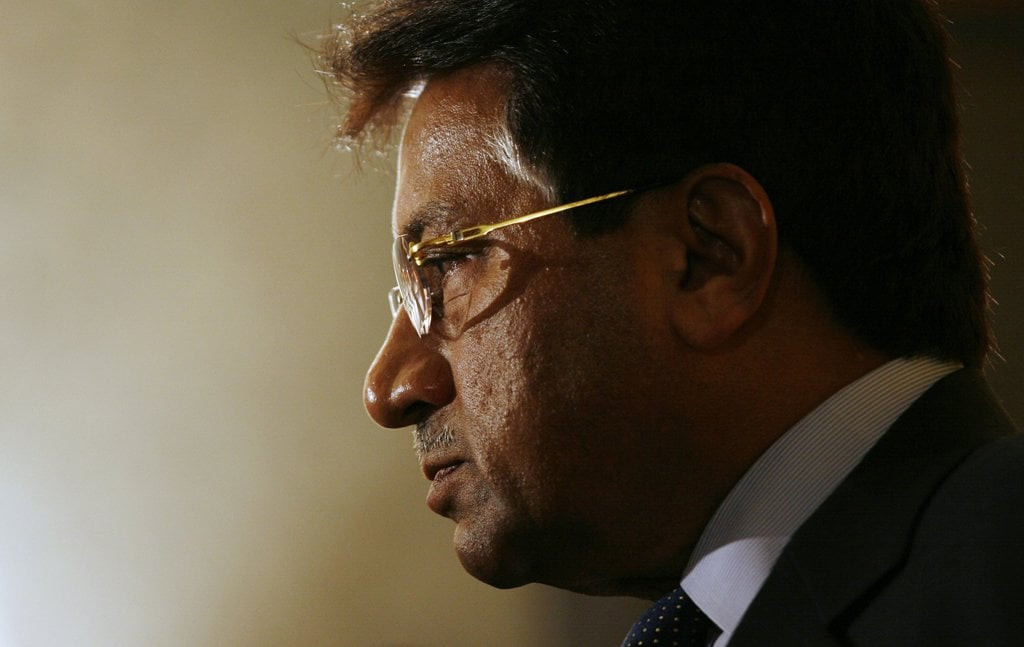
Former military ruler Gen (retd) Pervez Musharraf will be brought back home one last time for burial in a country he had governed with absolute power -- leaving behind a trail of a long eventful rule of the last military junta in Pakistan's chequered history.
He was under treatment for a rare disease at American Hospital in Dubai and died early Sunday.
From leading the country into war and positioning Pakistan as a front-line state in the post-9/11 war on terrorism, to ushering in an era of peace talks with India and being indicted for high treason in his twilight years before he cast himself into exile, Musharraf has left behind a legacy subject to some open questions as well as some unrivalled distinctions.
However, more importantly, his reign will stand out for almost resolving long-festering issues between India and Pakistan after back-channel talks between the two countries made unprecedented major progress on the issue of Kashmir.
When on October 12, 1999, then-prime minister Nawaz Sharif removed army chief Gen Pervez Musharraf and appointed ISI Chief Lt General Zaiuddin Butt as his successor, the move was meant to try the sacked four-star general and four other high-ranked officers for the Kargil misadventure.
Musharraf was accused of initiating the Kargil operation without informing Nawaz and the misadventure was aimed at sabotaging the peace process between Pakistan and India.
Months before the Kargil war, the then-Indian premier, Atal Behari Vajpayee, had travelled to Lahore via bus in a historic visit that rekindled hopes for a new beginning in ties between the newly declared nuclear South Asian neighbours.
But the decision to sack Musharraf backfired as his subordinate generals moved swiftly and removed Nawaz from power.
While the 1999 military coup was attributed to the months of bickering between Nawaz and Musharraf, it was differences between the civil and military leadership on the issue of India that derailed the elected government.
However, after becoming the military ruler, General Musharraf had now a bigger role and that was not just to manage the army but the entire country. This was when his worldview, particularly his approach towards India, changed.
The same Musharraf, who scuttled the promising peace process between India and Pakistan, started following the footsteps of Nawaz seeking rapprochement with New Delhi. In fact, he went a few steps further to reach out to India since being the army chief he had that luxury and control over the security establishment.
The famous Agra summit between Musharraf and Indian Prime Minister Vajpayee might have collapsed but it laid the foundation for future engagements between the two countries.
India, knowing that past efforts to resolve issues with Pakistan failed since the civilian governments didn't have much say on ties with New Delhi, thought that perhaps it was the best time to bury the past when Pakistan was ruled by a military dictator, who had the final power.
The two sides then ushered into an era of peace talks both covert and overt that raised the genuine prospects of resolving the longstanding Kashmir dispute.
The peace process between 2004 to 2007 was seen as a most productive phase where tangible progress was made on several key issues including Kashmir.
Brokered by the US, the two countries entered into a ceasefire along the Line of Control (LoC), a de facto border that divides Kashmir. People-to-people contacts were encouraged. Both sides issued thousands of visas for bilateral cricket series.
The movement of Kashmiris living on both sides of LoC was made easy. Trade routes were opened in the disputed territory.
All this was supposed to culminate in a summit meeting between Gen Musharraf and then prime minister Dr Manmohan Singh in early 2007.
The two countries were set to sign Sir Creek and Siachen agreements during the much-anticipated visit of the Indian Prime Minister.
More importantly, back-channel talks between the two countries made major progress on the issue of Kashmir.
The two sides were discussing an out-of-box solution with the exchange of non-papers.
There was a four-point formula that envisaged making the LoC irrelevant, joint control of the disputed territory, allowing free movement of people on both parts kf Kashmir and eventually withdrawing troops.
Former foreign minister Khurshid Mehmood Kasuri wrote in his book that both countries were close to striking a deal.
But when the visit of Manmohan Singh was being planned, Gen Musharraf unceremoniously removed Chief Justice Iftikhar Muhammad Chaudhry in March 2007. The sacking triggered a strong reaction from the lawyers' community.
The movement later was joined by political parties making Musharraf highly unpopular. The lawyers' movement caused such political instability that Manmohan's visit never materialised. Had there been no political upheaval in Pakistan, the two countries might have reached a deal on Kashmir.
Some believed that even Musharraf's own generals were not happy with him at the time the way he sought the settlement of Kashmir. They were of the view that those generals used the lawyers' movement to discredit their own boss in order to make sure Musharraf could not strike any deal with India on Kashmir.
Brief timeline
Below is a timeline of his career and the events that took place during his rule and after.
Oct 6, 1998: Gen Pervez Musharraf is appointed as the new army chief following the resignation of his predecessor, Gen Jahangir Karamat.
May 3, 1999: Kargil war with longtime rival India starts which ended on July 6, 1999.
Oct 12, 1999: Musharraf topples the government of three-time premier Nawaz Sharif in a bloodless military coup.
June 20, 2001: Musharraf becomes president of Pakistan through a controversial referendum.
Oct 10, 2002: He holds general elections in the country that brings Pakistan Muslim League-Quaid-e -Azam (PML-Q) and its allies to power.
Nov 3, 2007: President Pervez Musharraf declares a state of emergency and suspends the 1973 Constitution, rendering as many as 61 judges of the superior judiciary dysfunctional, including Chief Justice Iftikhar Muhammad Chaudhry.
All private channels go off the air, and only state-controlled PTV releases a proclamation of emergency order which speaks of the "visible ascendancy in the activities of extremists" as the reason for imposing the emergency.
Nov 28, 2007: Musharraf retires from the military to focus full-time on politics, turning over control of the army to Gen Ashfaq Parvez Kayani.
Nov 29, 2007: The retired general takes the oath as a civilian president.
Dec 15, 2007: President Musharraf lifts the emergency, revokes the Provisional Constitutional Order and revives a Constitution amended through presidential decrees seeking to validate actions taken during the 42-day emergency period.
Chief justices and judges of the Supreme Court, high courts and Federal Shariat Court take a fresh oath.
June 7, 2008: Musharraf categorically declares he has no plans to resign or go into exile.
Aug 18, 2008: After ruling the country for nine years, President Musharraf resigns from office, averting the possibility of impeachment.
Treason trials
July 22, 2009: In an unprecedented move, the Supreme Court calls the former military ruler to defend his actions on Nov 3, 2007.
July 31, 2009: The Supreme Court rules that Musharraf's decision to impose a state of emergency on Nov 3, 2007, as well as his Provisional Constitutional Order, were illegal and unconstitutional. The court gives him seven days to respond.
Aug 6, 2009: Musharraf refuses to answer the charges against him and leaves Pakistan for the United Kingdom.
June 8, 2010: The former president's political aides launch a political party — the APML — with Musharraf as its chief.
March 22, 2013: Musharraf gets pre-homecoming protective bail for 10 days in three high-profile cases.
March 24, 2013: The self-exiled former president returns to Pakistan to contest general elections.
March 27, 2013: Senior counsel AK Dogar, during a hearing pertaining to strict adherence to Articles 62 and 63 during elections, refers to the Supreme Court’s ruling on Musharraf's actions on Nov 3, 2007. Reading out excerpts from the judgment, he argues that in overthrowing the constitution, Musharraf had committed the offence of high treason.
March 29, 2013: Sindh High Court grants an extension in bail for Musharraf but rules that he cannot leave the country without permission.
April 5, 2013: Supreme Court agrees to hear a petition seeking to prosecute Musharraf under Sections 2 and 3 of the High Treason (Punishment) Act, 1973.
April 7, 2013: Chief Justice Iftikhar Muhammad Chaudhry withdraws himself from the three-member bench formed to hear the treason case against Musharraf.
April 8, 2013: Supreme Court summons the former military ruler in the treason case against him. The court also instructs the Interior Ministry to add his name to the Exit Control List.
April 18, 2013: Musharraf flees from the premises of the Islamabad High Court after the cancellation of his bail application.
April 19, 2013: Musharraf surrenders in a magistrate's court in the judges' detention case. His farmhouse residence in the Chak Shahzad suburb of Islamabad is declared a sub-jail.
April 30, 2013: The Peshawar High Court bars Musharraf from ever contesting elections for either the National Assembly or the Senate.
June 5, 2013: Islamabad High Court judge Shaukat Aziz Siddiqui recuses himself from hearing Musharraf's post-arrest bail plea in the judges' detention case, citing a "malicious campaign" against him "after I rejected the pre-arrest bail of the applicant in April".
June 14, 2013: Minister for Law and Justice Zahid Hamid distances himself from the 2007 state of emergency. The minister says there was no question of him having allegedly abetted Musharraf as the proclamation of emergency order came from the former president. He also denies having had any contact with Musharraf.
June 24, 2013: Prime Minister Nawaz Sharif tells the National Assembly that his government will ask the Supreme Court to try Musharraf under Article 6 of the Constitution.
Nov 18, 2013: The Supreme Court under Chief Justice Iftikhar Chaudhry agrees to set up a special tribunal to try the former president for high treason.
Nov 19, 2013: The Pakistan Muslim League-Nawaz (PML-N) government submits five charges of high treason against Musharraf in a special court. A three-member bench to hear the case is also formed.
Dec 12, 2013: Special court summons Musharraf to face treason charges.
Dec 20, 2013: The former army chief, in an interview, seeks “forgiveness” for any wrongs he may have committed during his nine-year rule.
Jan 2, 2014: Musharraf is moved to a hospital after suffering a "heart problem" while on his way to a special court hearing of the high treason case against him. His arrest warrant is not issued on medical grounds.
Jan 7, 2014: The Armed Forces Institute of Cardiology submits Musharraf's medical report to the court, detailing that the former army chief is suffering from "triple-vessel coronary artery disease and eight other diseases".
Jan 16, 2014: Special court orders the Armed Forces Institute of Cardiology to constitute a medical board to assess the former president's health and to submit a report. The board subsequently declares Musharraf to be in a "critical state" and recommends his treatment at a place of his choice.
Jan 28, 2014: The prosecution expresses a lack of confidence in Musharraf's medical report and requests the special court to summon the Armed Forces Institute of Cardiology chief for cross-examination.
Feb 7, 2014: Special court once again orders Musharraf to appear in the treason case.
Feb 18, 2014: After avoiding 22 consecutive hearings, Musharraf finally appears in court, but no charges are framed against him as the defence argues that the case should be heard in a military court.
Feb 21, 2014: Special court rules that the former army chief is not to be tried in a military court.
March 30, 2014: Musharraf is indicted for treason and pleads not guilty to all charges.
April 1, 2014: The PML-N government offers to fly Musharraf's ailing mother to Pakistan from Sharjah.
April 2, 2014: The government rejects Musharraf's petition seeking the removal of his name from the Exit Control List.
April 3, 2014: Musharraf petitions the Supreme Court for the removal of his name from the Exit Control List so he may travel abroad to visit his ailing mother.
April 7, 2014: Army chief Gen Raheel Sharif breaks his silence over Musharraf's high treason trial, saying the army will "preserve its own dignity and institutional pride" in response to “the concerns of soldiers on undue criticism of the institution (army) in recent days”.
May 14, 2014: Federal Investigation Agency declares it has "irrefutable proof" that Musharraf illegally imposed the 2007 state of emergency.
June 12, 2014: Sindh High Court strikes down the federal government's order barring Musharraf from overseas travel, ruling that "not a single ground” was mentioned in the memorandum placing his name on the Exit Control List.
June 13, 2014: Special court rejects Musharraf’s plea for details of "abettors" who had suggested, endorsed, or implemented the Nov 3, 2007 state of emergency.
June 14, 2014: The government moves the top court against the Sindh High Court’s ruling allowing Musharraf's travel abroad.
June 23, 2014: The apex court suspends the Sindh High Court’s judgment allowing Musharraf to travel abroad until it decides on the pending appeal.
Sept 8, 2014: Musharraf's legal team gets hold of crucial evidence pointing toward the then-premier Shaukat Aziz's role in the imposition of the 2007 state of emergency.
Oct 15, 2014: The former president's defence team asks the special court for a collective trial of all his accomplices.
Nov 21, 2014: Special court directs the federal government to resubmit its complaint in the treason case, this time including the names of former premier Aziz, Federal Minister Zahid Hamid -- who was law minister at the time — and former chief justice Abdul Hameed Dogar to the charge sheet.
Dec 22, 2015: Musharraf says he invoked the state of emergency after consulting Gen Ashfaq Parvez Kayani among other civilian and military leaders.
March 14, 2016: The former president seeks one-time permission to go abroad on medical grounds.
March 16, 2016: Supreme Court orders the removal of Musharraf's name from the Exit Control List, allowing him to travel abroad for treatment.
March 18, 2016: Musharraf leaves for Dubai to seek medical treatment, promising to come back to his "beloved homeland" in a few weeks.
May 11, 2016: Special court declares Musharraf an absconder in the high treason case against him.
Nov 16, 2016: Musharraf’s farmhouse is attached to the high treason case.
Feb 27, 2017: Former president launches a career as a TV analyst.
Nov 10, 2017: Musharraf announces the 'grand alliance' of 23 political parties that will operate under the umbrella of the Pakistan Awami Ittehad (PAI).
March 29, 2018: Special court bench dissolves after Justice Yahya Afridi recuses himself from hearing the high treason case.
April 7, 2018: Chief Justice Mian Saqib Nisar reconstitutes bench hearing Musharraf treason case.
May 31, 2018: Interior Ministry, complying with the special court's orders, asks the National Database and Registration Authority and the Directorate General of Immigration and Passports to suspend Musharraf's national identity card and passport.
June 7, 2018: Supreme Court allows Musharraf to run for polls on the condition that he appears in person before the court.
June 20, 2018: Musharraf says he was set to return to Pakistan but the Supreme Court's order barring authorities from arresting him made him change his mind.
July 30, 2018: The prosecution head in the treason case against Musharraf quits.
Aug 3, 2018: Special court decides to resume the trial — stalled due to Musharraf's departure from the country — beginning Aug 20.
Aug 20, 2018: Citing threats to his life, Musharraf seeks presidential security to appear before the court in the treason case.
Aug 29, 2018: Special court is told that Interpol has refused to issue a red warrant for Musharraf's repatriation from the United Arab Emirates, where he has been living since 2016.
Oct 2, 2018: Chief Justice Mian Saqib Nisar grills Musharraf's lawyer on the "brave commando's" overdue return to Pakistan.
Oct 24, 2018: APML discloses that Musharraf is suffering from amyloidosis and has difficulty standing and walking.
Nov 19, 2018: Court tells Musharraf's counsel to convince Musharraf to return and provide his itinerary so the treason case could proceed.
March 31, 2019: Supreme Court orders Musharraf to appear before the special court in the treason case on May 2 or lose his right of defence.
April 1, 2019: Supreme Court under Chief Justice Asif Saeed Khosa issues a decree telling the special court to proceed in the treason case without Musharraf's statement if he fails to appear the following month.
June 11, 2019: Supreme Court orders the National Database and Registration Authority to unblock Musharraf's Computerized National Identity Card and passport.
July 30, 2019: The prosecution head in the treason case against Musharraf quits.
Oct 8, 2019: Special court decides to hear the treason trial on a daily basis from Oct 24.
Oct 24, 2019: The Pakistan Tehreek-e-Insaf government sacks the prosecution team in the treason case.
Nov 19, 2019: The special court concludes its proceedings in the high treason case against the former military ruler, saying a verdict will be pronounced on Nov 28.
Nov 23, 2019: Musharraf petitions the Lahore High Court to challenge the reservation of the judgment in the treason case.
Nov 25, 2019: The case takes a new turn as the Interior Ministry files a petition in the Islamabad High Court requesting it to set aside the special court's decision to reserve a judgment in the case without hearing from the prosecution.
Nov 26, 2019: Lahore High Court accepts to hear Musharraf's petition challenging the special court's decision.
Nov 27, 2019: Islamabad High Court stops special court from announcing the verdict in Musharraf treason case.
Dec 5, 2019: Special court says it will announce the verdict in the case on Dec 17. Musharraf moves the Lahore High Court to stay the trial at the special court until his earlier petition pending adjudication by the high court is decided.
Dec 17, 2019: Special court hands Musharraf death sentence in the long, drawn-out high treason case against him.
Jan 13, 2020: A three-member bench of Lahore High Court sets aside his conviction in the high treason case.
Feb 5, 2023: Musharraf passes away in a hospital in Dubai after a protracted illness.



1719660634-1/BeFunky-collage-nicole-(1)1719660634-1-165x106.webp)

1732276540-0/kim-(10)1732276540-0-165x106.webp)

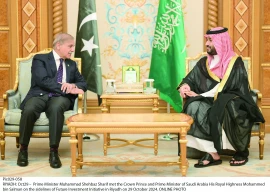
1724249382-0/Untitled-(640-x-480-px)1724249382-0-270x192.webp)

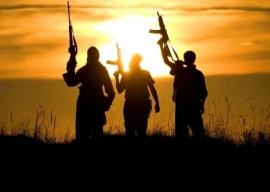
1732270499-0/Express-Tribune-(7)1732270499-0-270x192.webp)
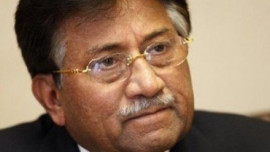

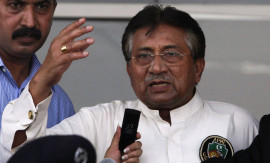






COMMENTS (2)
Comments are moderated and generally will be posted if they are on-topic and not abusive.
For more information, please see our Comments FAQ